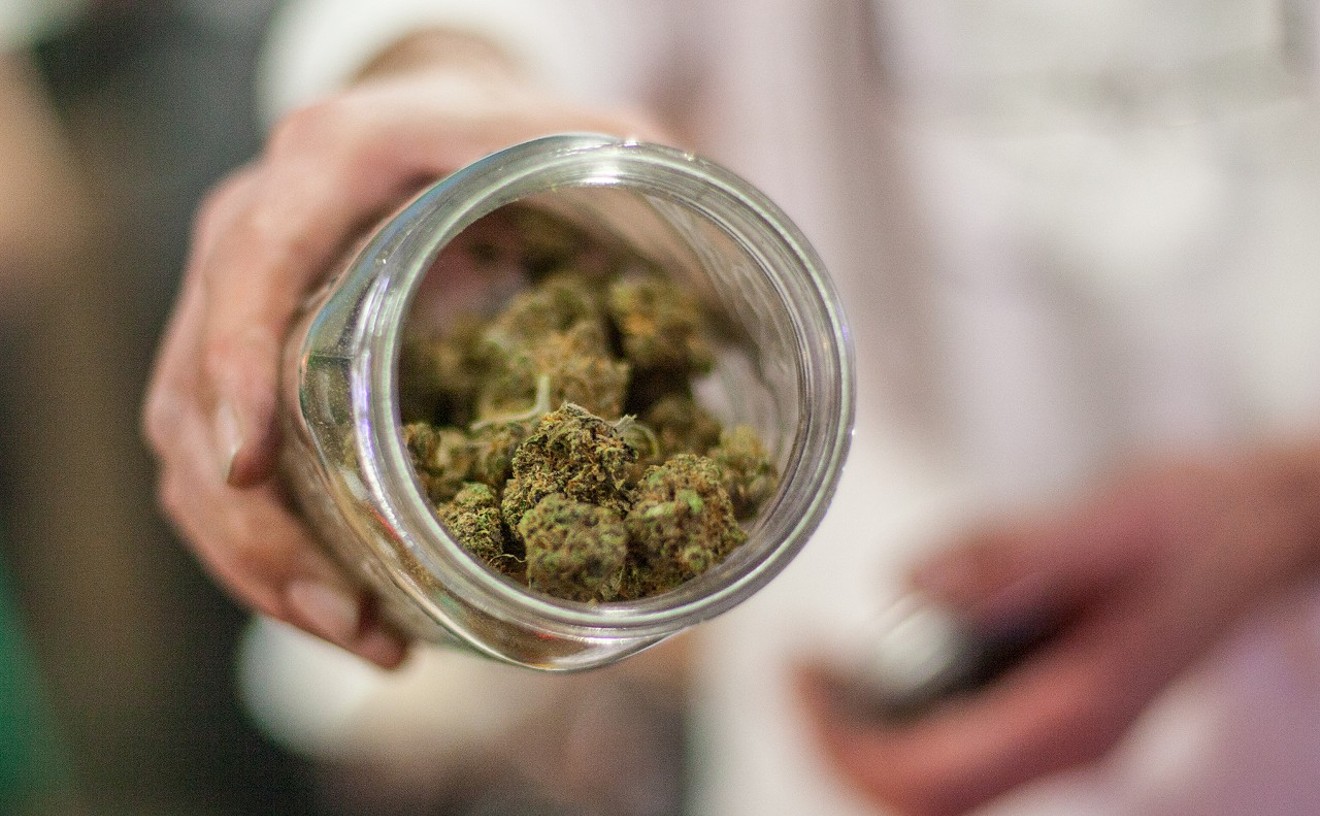A bill floating around the Colorado Legislature would doom the state's marijuana industry if it passed. And while the chances of that bill passing are slim — it hasn't even been introduced — its mere existence could signal the start of a battle over the potency of commercial pot products.
The bill, drafted by state Representative Yadira Caraveo, would ban any form of legal marijuana, recreational or medical, testing over 15 percent THC. It also calls for a number of restrictions to the state's medical marijuana program, including a requirement that medical marijuana patients only be allowed to purchase a pre-designated dosage and allotment of certain products decided by a physician, similar to a drug prescription.
Caraveo's bill proposes limiting the potency of edibles, as well, and would ban any roadside signage for marijuana, as well as prohibit the hiring of social media influencers "who appeal to minors in order to market its store."
Some parts of the bill are sweeping, others just confusing. One line calls for banning any marijuana concentrate containing "a known human carcinogen," but any form of marijuana smoke contains carcinogens. Another provision would prohibit the sale of marijuana suppositories, medical or recreational, as well as flavored vaporizer products, inhalers and other pot products.
While the entire bill has the marijuana industry up in arms, Jason Warf, director of the Southern Colorado Cannabis Council, a lobbying group that represents both patients and industry members, is particularly concerned about the proposed tracking system for medical marijuana patients and their purchases, which raises issues of legal privacy.
"Nothing is salvageable" in the bill's language, Warf says, adding that he believes some of its restrictions could be unconstitutional, since the state's medical marijuana program and recreational legalization were both enacted by constitutional amendments.
"The potency measure would affect both [medical and recreational marijuana] industries. In my mind, I would see it being nearly impossible to provide anything other than flower under these rules, and even with flower nowadays, that would be extremely difficult," he adds.
Marijuana industry representatives and medical marijuana advocates don't expect the bill as written to pass a House committee hearing, let alone be passed by the Colorado Legislature. Responsible for more than $2 billion in sales in 2020 and nearly $1.6 billion in tax revenue since 2014, the marijuana industry is more regulated and entrenched in Colorado than in perhaps any other state. And even if this measure did pass, Governor Jared Polis, a supporter of the marijuana industry both in Congress and the Governor's Office, could always veto it. So why try?
Although Caraveo's office hasn't responded to requests for comment about the proposed bill, in the past she has spoken about her concerns regarding marijuana use, particularly among children and medical patients. A Democrat and pediatrician, Caraveo initially voted against a proposal to add autism to the state's list of medical marijuana conditions, citing the need for more physician approval if child patients were to qualify — though she did eventually vote in favor of the bill after an amendment was added requiring just that.
"It’s something that has been legal here for some time, both medically and recreationally, and something that our party, basically, as a Democrat, has been very supportive of. But I think I have a completely different perspective on legalization and the expansion of use for medical conditions, because I think of it through the perspective of a pediatrician and how it’s going to affect children. And so I’ve taken a few votes against the rest of my caucus, because I look at it solely through the lens of how it will affect kids," Caraveo said in a 2019 interview.
Warf and several other marijuana industry representatives say they believe that larger anti-marijuana groups are behind Caraveo's proposal, using Colorado state politics as a first step to control the expansion of legalized marijuana across the country.
"What we've seen here before is they like to use Colorado as a testing ground, like a springboard to get traction, even if it doesn't go anywhere. But what we will see is them trying to take this to other markets," Warf argues.
Since Colorado and Washington voters legalized recreational marijuana in 2012, another thirteen states and Washington, D.C., have joined them, and prohibitionists have changed their strategy. No longer using their time and resources to fight legalization, groups like Smart Approaches to Marijuana and Smart Colorado now pursue industry guardrails in the name of youth prevention.
Both groups are mum regarding any potential legislative efforts in Colorado, but they and similar groups have found willing ears elsewhere. Vermont's law legalizing recreational marijuana included a provision limiting THC potency in flower to 30 percent and concentrates to 60 percent. And Caraveo may not be the only Colorado lawmaker considering potency legislation. According to the Colorado Department of Public Health and Environment, the use of high-potency marijuana products rose significantly among teenagers from 2017 to 2019, and has more than doubled since 2015. The potency of marijuana has also vastly increased over the past several decades, with marijuana flower routinely testing over 20 percent THC and concentrates now reaching upwards of 90 percent.
A measure proposing a potency limit failed in the Colorado Legislature in 2016, while an initiative proposing a potency limit fell short of making the ballot that same year. In 2019, a proposed potency amendment to a bill overhauling commercial marijuana rules didn't have enough support to go to a vote. However, there were "murmurs without a bill" at the Colorado Capitol last year, according to former representative Jonathan Singer, and the pot industry has been bracing for a potential push for a potency cap.
For Jordan Wellington, a marijuana attorney who specializes in policy for Denver firm Vicente Sederberg, cutting out the majority of now-legal marijuana products is "using a sledgehammer for a scalpel-worthy issue," he says, warning that it could send marijuana users to the black market for marijuana concentrates, which commonly require dangerous forms of extraction involving butane, ethanol or other solvents.
"If there is evidence that efforts to prevent teen use are falling short, let’s work together to address that problem through public education and treatment. We should discuss enforcement of existing regulations and criminal laws, since it is already illegal for minors to possess marijuana — outside of a bona fide physician-patient relationship — and cannabis businesses are already subject to extensive regulations to protect youth," Wellington says. "Banning a broad range of cannabis products consumed by adults in Colorado is not only likely unconstitutional, but it will also lead to a massive expansion of the underground cannabis market in the state."
Industry advocates worry that such an aggressive proposal could be the opening gambit in a negotiation process between anti-marijuana groups and lawmakers, resulting in a tamer but still constricting version looking more palatable by the time it reaches a House committee.
"In the current draft we've seen, we have no compromised position, and I don't believe any of my peers and colleagues do, either," Warf says. "And it's extremely unique that any marijuana lobbyists and reps are on the same page on anything."
Here's a draft of the bill obtained by Westword:
[
{
"name": "Air - MediumRectangle - Inline Content - Mobile Display Size",
"component": "12017618",
"insertPoint": "2",
"requiredCountToDisplay": "2",
"watchElement": ".fdn-content-body",
"astAdList": [
{
"adType": "rectangle",
"displayTargets": "mobile"
}
]
},{
"name": "Editor Picks",
"component": "17242653",
"insertPoint": "4",
"requiredCountToDisplay": "1",
"watchElement": ".fdn-content-body",
"astAdList": [
{
"adType": "rectangle",
"displayTargets": "desktop|tablet"
},{
"adType": "rectangle",
"displayTargets": "desktop|tablet|mobile"
}
]
},{
"name": "Inline Links",
"component": "18838239",
"insertPoint": "8th",
"startingPoint": 8,
"requiredCountToDisplay": "7",
"maxInsertions": 25
},{
"name": "Air - MediumRectangle - Combo - Inline Content",
"component": "17261320",
"insertPoint": "8th",
"startingPoint": 8,
"requiredCountToDisplay": "7",
"maxInsertions": 25,
"watchElement": ".fdn-content-body",
"astAdList": [
{
"adType": "rectangle",
"displayTargets": "desktop|tablet"
},{
"adType": "rectangle",
"displayTargets": "desktop|tablet|mobile"
}
]
},{
"name": "Inline Links",
"component": "18838239",
"insertPoint": "8th",
"startingPoint": 12,
"requiredCountToDisplay": "11",
"maxInsertions": 25
},{
"name": "Air - Leaderboard Tower - Combo - Inline Content",
"component": "17261321",
"insertPoint": "8th",
"startingPoint": 12,
"requiredCountToDisplay": "11",
"maxInsertions": 25,
"watchElement": ".fdn-content-body",
"astAdList": [
{
"adType": "leaderboardInlineContent",
"displayTargets": "desktop|tablet"
},{
"adType": "tower",
"displayTargets": "mobile"
}
]
}
]












